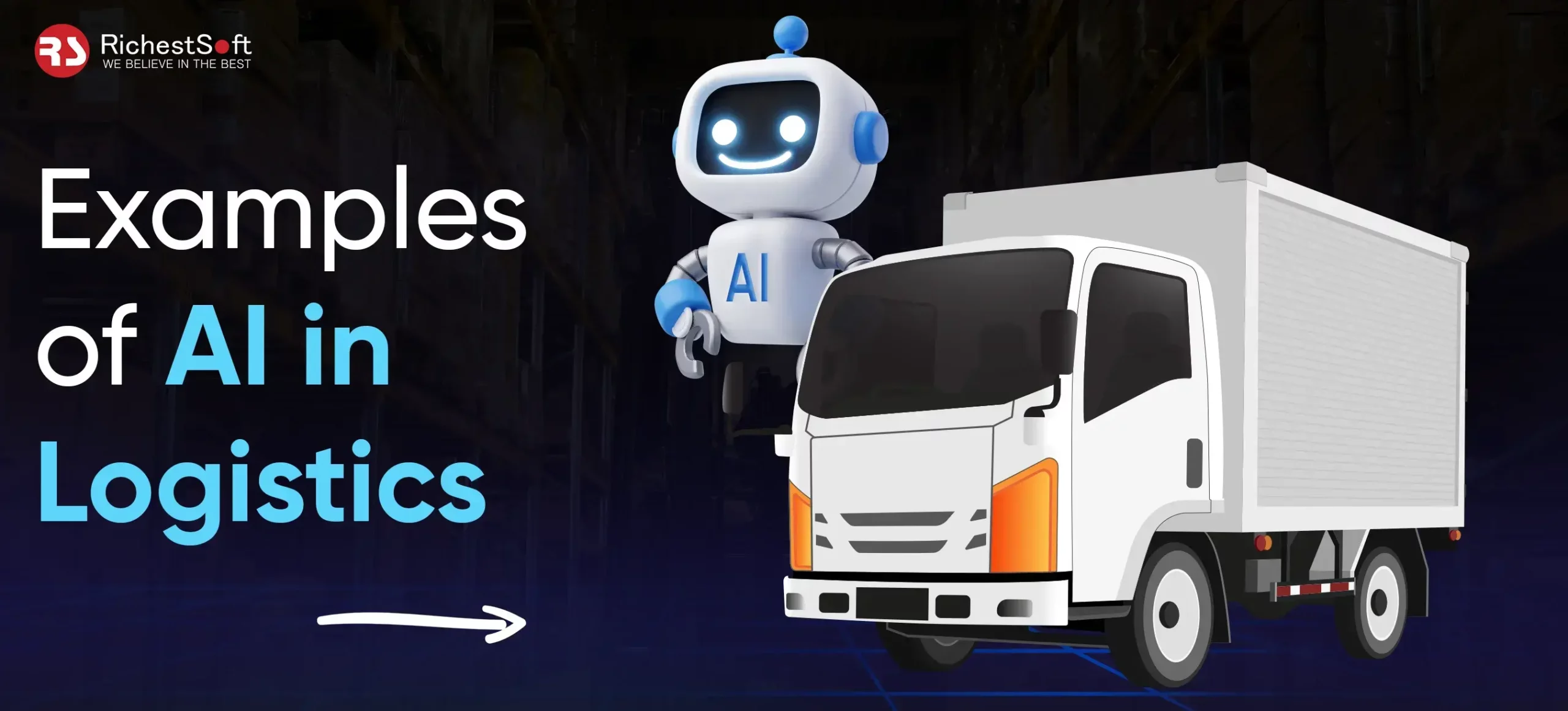October 16, 2024
AI ( artificial intelligence) has crossed almost many boundaries in taking business to great heights, and the Logistic industry is not an exception.
As an overview from the reports of Statista, logistic businesses lose many hours doing work manually. But with the integration of AI in the logistics business, the same work could be managed more efficiently and effectively — including tweaking purchase orders, processing papers, and answering supplier inquiries.
And let us tell you due to this reason many logistic businesses have begun implementing AI in supply chain tasks. As a result, businesses are freed up from those complicated tasks that AI can handle.
So, do you also own a logistic business?
Keep reading this post! Below we have shared a guide on the use case examples of AI in logistics, that will help you stand out your businesses in the industry.

Examples of AI in Logistics
Making remarkable strides, the use of AI in logistics examples is standing at the forefront of significant advancements. However, when talking about examples then it is usually substituted into 6 categories, including:
- Logistic planning
- Automated Warehousing
- Autonomous Things
- Analytics
- Back Office
- Sales and marketing
Want to explore them? Here is the detailed version of these categories that belong to the examples of AI in logistics.
Logistics Planning
Well, this is the initial phase in the examples of AI in logistics that requires significant planning that requires coordinating suppliers, audience, and different units within the company. Machine learning solutions make planning activities easier as they are good at navigating scenario analysis and numerical analytics. This category includes these
1) Demand Forecasting
AI potential enables organizations to use real-time data in their forecasting efforts This is the reason the AI-driven demand forecasting strategies eliminated the error rates significantly compared to typical forecasting strategies such as ARIMA, autoregressive integrated moving average, and the exponential smoothing methods
In fact, the improved accuracy in demand prediction is highly essential due to the below-mentioned reasons:
- Manufacturers optimizes dispatched vehicles to local warehouses more accurately and minimizes the operational costs since they improve their manpower planning
- Local warehouses can minimize the holding costs (opportunity cost of holding the item instead of investing the money elsewhere)
- Audiences are less likely to experience stockouts that minimize their satisfaction.
2) Supply Planning
Artificial intelligence enables businesses to address the demand instantly. This helps them update their supply planning parameters uniquely and smoothly to optimize AI in supply chain flow. With supply planning, businesses use fewer resources since dynamic planning minimizes waste.
Automated Warehousing
3) Warehouse Robots
Warehouse robots are a perfect example of AI in supply chain that is invested hugely to take logistic management to the next level. However, as per the reports of Markets and Markets, the warehouse robotics market is estimated to be worth USD 6.1 billion in 2023. Also, it is expected to reach USD 10.5 billion in 2028, at a CAGR of 11.4% during the forecast period.
4) Damage Detection / Visual Inspection
Damaged products lead to unsatisfied users and churns. However, computer vision technology enables logistic businesses to detect damages and ensure quality control in warehouse operations. Logistics managers can analyze the size and type of damage and make use of AI in supply chain to reduce further damage.
5) Predictive Maintenance
Predictive maintenance is a great use case examples of AI in logistics because it potentially predicts machine failures in logistics by giving an overview of real-time data collected from IoT sensors in machines. ML-driven analytics tools enhance predictive analytics and address the pattern in sensor data to enable technicians to take action before the occurrence of any failure.
Autonomous Things
Autonomous things fit perfectly within the AI in logistics examples and work seamlessly without the involvement of human interaction. These are AI driven machines that include self-driving vehicles, drones, and robotics. However, it is expected to see more autonomous devices in the logistics industry due to the industry’s suitability for AI in Supply chain management.
6) Self-Driving Vehicles
Self-driving cars is an ideal AI in logistic examples that can potentially transform the industry by eliminating the huge reliance on human drivers. AI in supply chain management uses technologies such as platooning, focusing on the driver’s health and safety while minimizing the carbon emissions and fuel usage of vehicles.
7) Delivery Drones
For the logistics industry, delivery drones are kind of useful machines where businesses can deliver products to places where a ground transfer is complicated. Specifically in the healthcare industry, where pharmaceutical products have very less shelf life span. In such circumstances delivery drones reduce waste costs and prevent investments in expensive storage facilities.
Analytics
8) Dynamic Pricing
Dynamic pricing is real-time pricing, one of the top tier AI in logistics examples. In this usually the price of a product changes as per demand, supply, competition price, and subsidiary product prices. However, this pricing software mostly makes use of the ML algorithms to analyze user’s past data in real-team so that it can respond to demand fluctuations instantly by price adjustments.
9) Route Optimization / Freight Management
This use case of AI in Logistic example- Route optimization / Freight management helps businesses to analyze existing routing and track route optimization. However, route optimization makes use of shortest-path algorithms in graph analytics discipline to identify the highly suitable route for logistics vehicles.
Back office
Every business, including the logistic industry has back-office tasks. For example, the logistics-related forms i.e., a bill of lading from where the structured data needs to be manually extracted. Most businesses do this manually. But AI in supply chain can significantly help here.
10) Automating Document Processing
Invoice/bill of lading/rate sheet documents enhances the interaction between the shoppers, suppliers, and logistics service providers. Document automation technologies are great use case examples of AI in logistics that enhances the efficiency of processing these documents by error reconciliation, automating data input, and document processing.
11) Automating Other Manual Office Tasks
Hyper Automation, also referred to as intelligent business process automation. This means it includes the use of AI, process mining, robotic process automation (RPA), and several other technologies to automate processes in a secure way. With these technologies, Logistic businesses can automate multiple back-office tasks, such as
- Scheduling and tracking
- Report generation
- Email processing
12) Customer Service Chatbot
With customer service chatbot users can contact companies for any issue they experience in delivery. Customer service chatbots can handle low-to-medium customer support tasks such as:
- Amending an order
- Requesting a delivery
- Responding to a FAQ
- Tracking shipment
Chatbots are also worthy tech to enhance the user experience. Chatbot analytics strategies enable businesses to analyze their targeted audience better to level up the customer journey they deliver.
Sales & Marketing
13) Lead Scoring
Lead scoring is the AI in logistics examples that means enabling sales reps to focus on the right prospects. It automatically assigns scores to leads based on users profiles, behavior, and interests. This AI-based lead scoring system uses ML algorithms to process data in real time and accurately analyze which leads have the possibility to convert into customers.
14) Routine Marketing
AI in supply chain management can be used to help logistics service providers automate routine marketing tasks, for example email marketing and content creation.
15) Sales And Marketing Analytics
AI in supply chain management provides more clear sales and marketing analytics. AI-powered tools can be used to help logistics businesses analyze user behavior and use predictive analytics to understand what they are likely to do next. AI can also be used to analyze changes in the market, allowing logistics service providers to stay at the forefront of the competition and make data-driven decisions for greater efficiency.
How is AI impacting Logistics?
The utilization of AI in logistics has been predominant and no wonder both have become tightly knitted with each other. Let us tell you the transformation of the logistics industry with AI has been profound and versatile.
AI has made a significant shift in the time-consuming hand-typed list and manual tasks into a streamlined machine where everything is done with high accuracy.
Below we have discussed in-depth about the impact on logistics with AI and without AI. This will help you understand the importance of AI in logistics. Keep reading!
Impact on Logistics With AI
Traditionally without AI, logistics have been very complex and time-consuming. Almost 2 to 3 typical warehouse management operations, like picking, packing, and shipping were done manually. However, many challenges were encountered by the traditional strategies. These challenges are as follows:
- Concerns like unexpected breakdowns and weather conditions can create significant delays in the logistics chains. Without AI merchants have to depend on manual static route planning that is unable to adapt to real-time changes in traffic or weather conditions. This can lead to longer transit times and increased fuel costs.
- AI in Supply chain management of logistics is just similar to sailing in the dark, almost a half percent of supply chain executives prove that they lack the end-to-end visibility necessary to proactively manage disruptions.
- Executing tangled tasks without AI is extremely time-consuming and can also lead to significant errors. Warehouse wastes almost 3000 hours per year due to overdue and manual processes, pointing to the inefficiencies of manual logistics systems.
Impact on Logistics Without AI
With the advent of AI in logistics have experienced a significant shift in every task. As per the reports of Market US, — By 2024, over 65% of AI tools in logistics will work smoothly with IoT devices and sensors. This is similar to all the tech talking and working together to make things run better.
Not just with this they also highlight that 50% of the logistics companies have made up their mind to shift towards the use of AI in their warehouse work almost on their own with robots by the end of 2024.
And let us tell you AI plays an essential role in addressing the challenges logistics encounter. Here is how AI impacts logistics.
- A warehouse with AI can significantly eliminate the stress of higher operation costs by 50% with safety of at least 90%.
- AI in logistics provides better handling of potential delays via predictive analysis.
- AI is perfect in optimizing the delivery routes saving valuable time and fuel.
- AI includes predictive features that prepare for unforeseen disruption in advance to ensure better planning.
- AI proficiently automates complicated tasks, which enhances operational efficiency and accuracy.
In short, the advent of AI in logistics has given the industry a total makeover, with experts predicting that AI will boost logistics productivity by more than 40% by the year 2035.
And let us clarify that AI integration services in logistics solves many intractable problems that potentially slow down everything and clears the way for smoother sailing.
Choose RichestSoft for AI Integration Services in Logistic Business
But why RichestSoft?
Well, whether you are a start-up or a well-established logistics business, let us tell you integrating and implementing the right AI tools to enhance logistics productivity depends on the type of experienced agency you choose for the right technological resources.
And you can undoubtedly rely on RichestSoft to maintain or enhance your logistic business productivity. We have worked with several companies to provide them with the digital product solutions to address their logistic business needs.
As a leading logistic software development company, we ensure to provide business with an effective app with advanced solutions and services like AI integration, app development services with blockchain technology, AR/VR and so on.
So don’t baffle yourself, choose us for your AI development services in your businesses.
Conclusion
Overall, AI integration is the best way to stand out in the logistic industry. It brings incredible possibilities to automate regular time consuming tasks with improved efficiency and less cost. Logistic businesses can use these examples of AI in the logistic industry and enjoy the front position in the competition.
Whether we’re talking about more traditional logistics, or ecommerce logistics, all businesses can benefit from AI. All you need is the best logistic software development company which is none other than— RichestSoft!
Yes! We provide effective logistic software development solutions with effective AI development services.

 +1 315 210 4488
+1 315 210 4488 +91 99888 06489
+91 99888 06489






